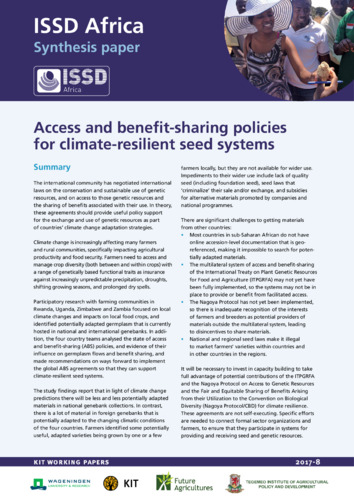Access and benefit-sharing policies for climate-resilient seed systems.
The synthesis report is part of a series of papers on Integrated Seed Sector Development (ISSD) in Africa’s thematic working group on Matching national realities with global commitments. The thematic working group addressed the main question on how African governments implement their global commitments while fostering a viable pluralistic sector. The main hypothesis was that making these commitments more coherent with the practices and realities of farmers and creating an enabling environment for strengthening multiple seed systems will increase farmers’ access to quality seed. Three main topics were discussed under this theme: access and benefit sharing for climate resilient seed systems; national and regional seed laws that support the development of a robust, integrated seed sector that supports smallholder farmers' needs; and creating room for informal and intermediary seed systems in a UPOV '91 informed Plant Variety Protection system.
This study provides an overview of climate related changes in past, present and future and the challenges to access to and exchange of genetic resources for climate change adaptation through different access and benefit sharing regimes in 4 countries – Zambia, Zimbabwe, Rwanda and Uganda. Findings from the studies indicate that most African countries face challenges in accessing required PGR for climate change adaptation because they do not have online accession-level documentation; they have not fully implemented international commitments related to ABS and national and regional seed laws hamper the flow of seeds and genetic resources. As a way forward the paper proposes capacity development for mutually supportive implementation of the ITPGRFA, Nagoya protocol and seed laws in ways which reflect the reality and diversity of different seed systems.

